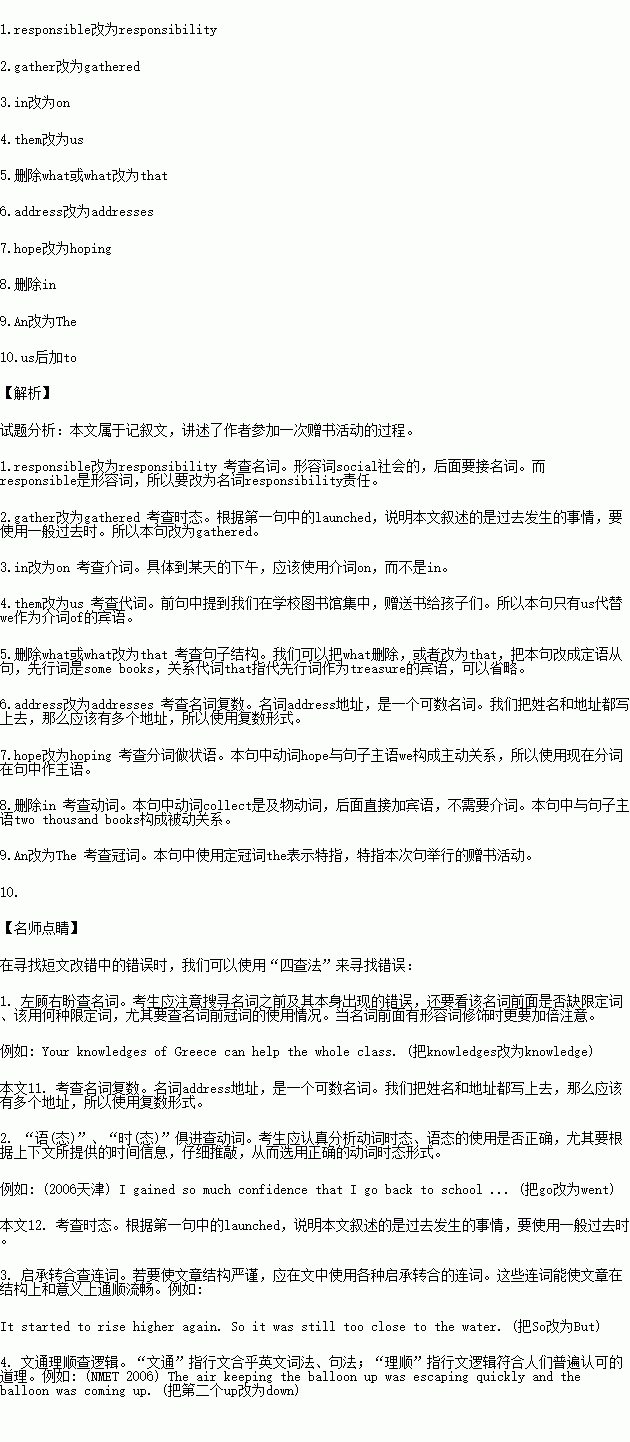ΧβΡΩΡΎ»ί
ΕΧΈΡΗΡ¥μ
ΦΌΕ®”Δ”οΩΈ…œάœ Π“Σ«σΆ§Ήά÷°ΦδΫΜΜΜ–όΗΡΉςΈΡΘ§«κΡψ–όΗΡΡψΆ§Ήά–¥ΒΡ“‘œ¬ΉςΈΡΓΘΈΡ÷–Ι≤”–10¥Π”ο―‘¥μΈσΘ§ΟΩΨδ÷–ΉνΕύ”–ΝΫ¥ΠΓΘΟΩ¥Π¥μΈσΫω…φΦΑ“ΜΗωΒΞ¥ ΒΡ‘ωΦ”ΓΔ…Ψ≥ΐΜρ–όΗΡΓΘ
‘ωΦ”ΘΚ‘Ύ»±¥ ¥ΠΦ”“ΜΗω¬©Ή÷ΖϊΚ≈(ΓΡ)Θ§≤Δ‘ΎΤδœ¬Οφ–¥≥ωΗΟΦ”ΒΡ¥ ΓΘ
…Ψ≥ΐΘΚΑ―Εύ”ύΒΡ¥ ”Ο–±œΏ( \ )Μ°ΒτΓΘ
–όΗΡΘΚ‘Ύ¥μΒΡ¥ œ¬Μ°“ΜΚαœΏΘ§≤Δ‘ΎΗΟ¥ œ¬Οφ–¥≥ω–όΗΡΚσΒΡ¥ ΓΘ
ΉΔ“βΘΚ1.ΟΩ¥Π¥μΈσΦΑΤδ–όΗΡΨυΫωœό“Μ¥ ΘΜ
2.÷Μ‘ –μ–όΗΡ10¥ΠΘ§Εύ’Ώ(¥”ΒΎ11¥ΠΤπ)≤ΜΦΤΖ÷ΓΘ
In order to strengthen our sense of social responsible, the students in our school launched an activity of donating books to the children in poor areas. We gather in front of the school library in the afternoon of Jan. 15th. Each of them gave away some books what we treasured. We even wrote our names and address on the front pages, hope to be contacted and make friends with the children who would receive the books. About two thousand books were collected in and sent away. An activity not only provided a good chance for us show love for others, but also helped us to make new friends.
 ΩΎΥψΧβΩ®±±Ψ©ΗΨ≈°ΕυΆ·≥ωΑφ…γœΒΝ–¥πΑΗ
ΩΎΥψΧβΩ®±±Ψ©ΗΨ≈°ΕυΆ·≥ωΑφ…γœΒΝ–¥πΑΗ
